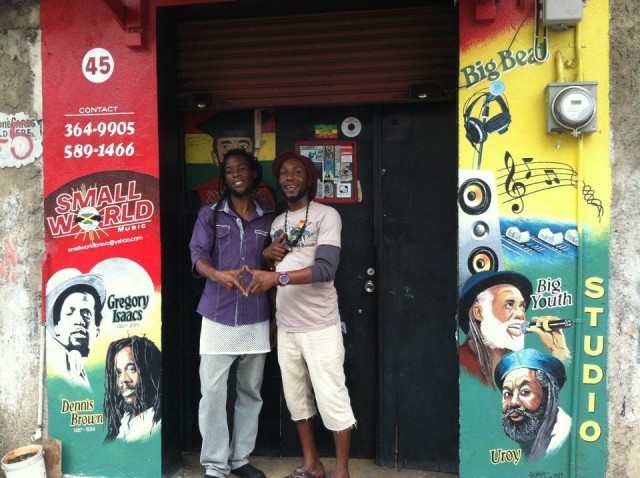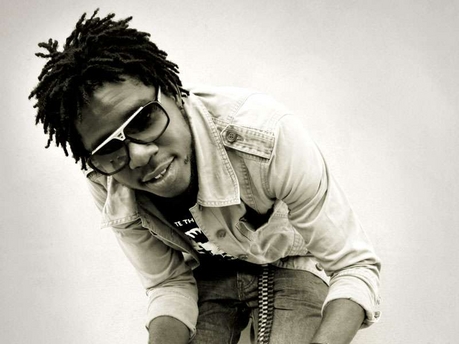Blog February 26, 2013
Dispatch from Kingston: A Sonic Reggae Revival on the Rise?
There's change afoot in the Jamaican musical landscape where a slew of new artists are choosing to forego the digital sounds of dancehall and its often explicit themes in favor of a return to live backing bands and a more positive vibe. The movement seems to also be partially fueled by a mostly lackluster year for dancehall in 2012 that saw its reigning and controversial king Vybz Kartel remain incarcerated, leaving a major gap in its musical landscape.
The effect of dancehall’s “off” year and just how popular and sustainable this new, live band, "conscious" movement is within Jamaica remains a question that seems to be on the mind of music fans and industry types alike in the country's capital.
 .
Still the absence of dancehall at times around the capital is particularly noticeable after its slow year. At the International Reggae Conference at the University of West Indies this year, the subject of dancehall's decline was a topic of much discussion. One paper's title, presented by Dr. Michael Barrett, explicitly spelled out the question that seemed to be on everyone's mind: "Has Dancehall Lost its Way or Have We Merely Transitioned to a Post-Dancehall Era?"
While another presenter noticed the differences from her last visit to the island three years ago for the conference.
"Last time I was here it was all Mavado and Vybz," she said outside Assembly Hall at UWI after a round-table discussion titled "Deconstructing Dancehall Performance and Literature."
"Now there's much more American music being played. It's definitely noticeable."
.
Still the absence of dancehall at times around the capital is particularly noticeable after its slow year. At the International Reggae Conference at the University of West Indies this year, the subject of dancehall's decline was a topic of much discussion. One paper's title, presented by Dr. Michael Barrett, explicitly spelled out the question that seemed to be on everyone's mind: "Has Dancehall Lost its Way or Have We Merely Transitioned to a Post-Dancehall Era?"
While another presenter noticed the differences from her last visit to the island three years ago for the conference.
"Last time I was here it was all Mavado and Vybz," she said outside Assembly Hall at UWI after a round-table discussion titled "Deconstructing Dancehall Performance and Literature."
"Now there's much more American music being played. It's definitely noticeable."
Dancehall Gone Amiss
After touching down at Norman Manley Airport in Kingston, one might expect to immediately hear the sounds of dancehall and reggae being mashed up across the airwaves and through a booming set of taxi speakers on your way into town. That's not necessarily the case, though. Don’t be surprised if the cab you take plays a slow jams mix of '70s and '80s American R&B instead. Or if a late dinner at Scotchies or a lunch at the popular, uptown Hot Pot fails to play a single lick of ska guitar, one drop or a dancehall beat. Of course, this is a typical uptown vibe, where the soundtrack of establishments in neighborhoods like New Kingston and Liguanea are often of the easy listening type with Bob Marley added for the tourists. Yet even the bars at night often mix the reggae with hip-hop, soul music and even indie rock. A Wednesday evening spent at Weddy Weddy; run by Stone Love, the longest running soundsystem in Jamaica, will dedicate a large portion of it’s set to music from outside of the island. Jamaicans have always had an affinity for music made beyond its shores, though, particularly American R&B and pop. "Jamaicans are emotional people. We love music that is emotional. We even love Michael Bolton," explained Mitchie Williams who runs Rockers International Record Store in downtown Kingston. And sure enough, just down the street from Rockers is Small World Studio, a bathroom-sized recording space where if giving the privilege to enter, you will see photos of Celine Dion and Mr. Bolton himself on the wall next to photos of reggae giants like Dennis Brown and Gregory Isaacs. .
Still the absence of dancehall at times around the capital is particularly noticeable after its slow year. At the International Reggae Conference at the University of West Indies this year, the subject of dancehall's decline was a topic of much discussion. One paper's title, presented by Dr. Michael Barrett, explicitly spelled out the question that seemed to be on everyone's mind: "Has Dancehall Lost its Way or Have We Merely Transitioned to a Post-Dancehall Era?"
While another presenter noticed the differences from her last visit to the island three years ago for the conference.
"Last time I was here it was all Mavado and Vybz," she said outside Assembly Hall at UWI after a round-table discussion titled "Deconstructing Dancehall Performance and Literature."
"Now there's much more American music being played. It's definitely noticeable."
.
Still the absence of dancehall at times around the capital is particularly noticeable after its slow year. At the International Reggae Conference at the University of West Indies this year, the subject of dancehall's decline was a topic of much discussion. One paper's title, presented by Dr. Michael Barrett, explicitly spelled out the question that seemed to be on everyone's mind: "Has Dancehall Lost its Way or Have We Merely Transitioned to a Post-Dancehall Era?"
While another presenter noticed the differences from her last visit to the island three years ago for the conference.
"Last time I was here it was all Mavado and Vybz," she said outside Assembly Hall at UWI after a round-table discussion titled "Deconstructing Dancehall Performance and Literature."
"Now there's much more American music being played. It's definitely noticeable."









